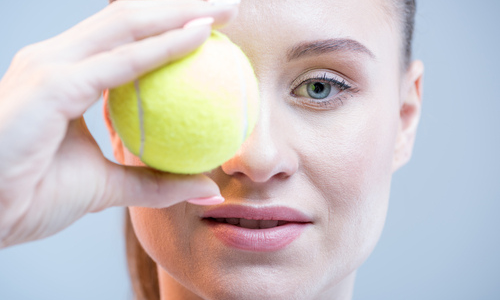
Eye Health for Athletes - Why Vision is Important in Sports
Eyesight is a crucial, yet often overlooked, aspect of sports ability. Without good vision, scoring points, hitting balls, and fending off opponents becomes much more difficult.
Why Good Vision Is Particularly Important for Athletes
It's difficult to determine which player has the ball or accurately judge your distance from the golf hole if everything in front of you is blurry. Although some athletes are lucky enough to have 20/20 vision, many find it difficult to see clearly due to common refractive errors like myopia (nearsightedness) or hyperopia (farsightedness.) In fact, more than 150 million Americans wear some type of corrective eyewear due to refractive errors, according to the American Academy of Ophthalmology.
Visual acuity, the ability to see objects and images sharply, isn't the only aspect of good vision. Good depth perception is needed to line up a shot accurately, while peripheral (side) vision is essential for spotting a member of the opposing team intent on stealing the ball from you.
Tracking, the ability to follow a moving object with your eyes, makes it possible to estimate where a ball will land or spot its path in the sky. Even subtle problems with eye alignment, eye teaming, focusing, tracking, or other visual skills can affect your sports performance.
Dry eye might also affect your vision, no matter what type of sport you play. The condition is more likely to be a problem during windy, sunny, or dusty days. Your risk of dry eye increases as you get older, but the condition can be a side effect of some prescription medications or caused by certain health conditions. When your eyes become too dry, you may experience blurry vision, sensitivity to light, discomfort, or a foreign body sensation.
Even if you don't have any vision problems, glare from the sun or lights may interfere with your ability to see well. Although glare can be an issue for anyone, it tends to affect athletes with light eyes more than those with dark eyes.
Caring for Your Vision
Taking a few of these steps will help you protect and enhance your vision:
- Wear Eye Protection. Eye injuries can cause permanent or temporary vision loss. The injuries occur most frequently in basketball, baseball, water sports, and racquet sports, according to FamilyDoctor.com. Wearing shatterproof, polycarbonate goggles that completely cover your eyes is the easiest way to prevent an eye injury.
- Schedule Yearly Visits with the Optometrist. Even minor changes in your vision can affect your sports performance. Unfortunately, you'll never know your prescription isn't strong enough or an alignment problem is responsible for your depth perception issues if you don't make time for a comprehensive eye examination.
- Reduce Glare. Glare from lights or the sun is a common cause of vision complaints from athletes. Your optometrist can recommend tinted glasses or sunglasses that help reduce the effects of glare.
- Consider Contact Lenses. Contact lenses may offer clearer vision than eyeglasses, plus the lenses never slip or fog over on cold days.
- Take Advantage of the Latest Eyeglass Lens Options. Both polycarbonate and Trivex lenses are good choices if you want a lightweight, impact-resistant lens that's tough enough to wear while playing sports. Trivex lenses offer exceptional clarity and help reduce halos around lights.
- Keep Your Eyes Moist. Artificial tears or eye drops will keep your eyes moist during games or practices. If over-the-counter drops aren't helpful, your optometrist may offer prescription eye drops or recommend adding tiny plugs to the drainage channels in your eyes. Wearing goggles or wraparound sunglasses may help prevent your eyes from drying out on sunny or windy days.
- Try a Few Exercises. If you'd like to improve your tracking, focusing, or eye teaming abilities, your optometrist can recommend a few activities or games that can help you fine-tune your visual skills.
- Don't Ignore Eye Injuries. Even seemingly minor eye injuries should be examined by your eye doctor. Call your optometrist or go to the emergency room immediately if you have severe pain, bleeding, discharge, vision loss, a cut on or in your eye, or something stuck on or in your eye. Prompt treatment can reduce the risk of vision damage.
Regular eye exams are a must if you're an athlete. Call our office to schedule your visit.
Sources:
American Academy of Ophthalmology: Eye Health Statistics
American Academy of Ophthalmology: Sports Eye Safety, 5/6/19
U.S. News & World Report: The Link Between Good Eyesight and Sports Performance, 5/29/18
